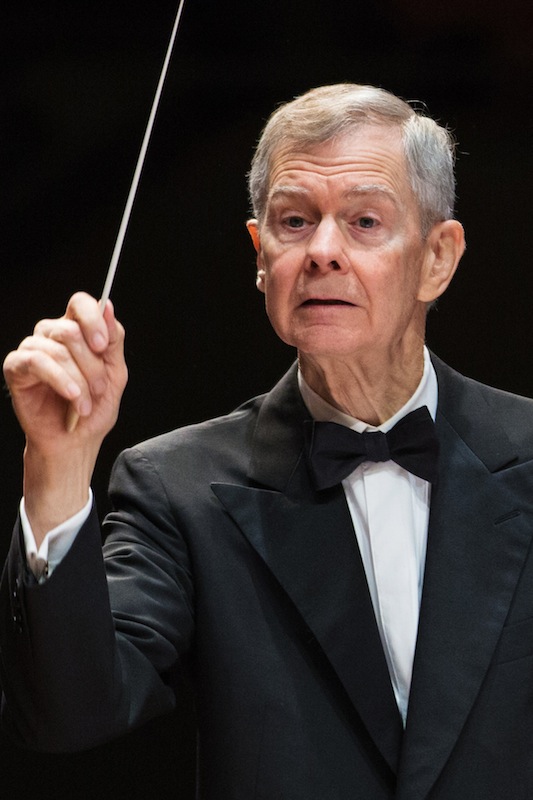New England Philharmonic pays homage to Gunther Schuller
With the death of Gunther Schuller this past summer, concerts paying tribute to the longtime Boston-based composer are turning out to be a prominent feature of the local concert season.
Sunday afternoon at the Tsai Performance Center, Richard Pittman and the New England Philharmonic kicked off the celebrations of Schuller’s life and work with the belated Boston premiere of one of his most personal pieces.
The concert was originally conceived as a celebration of Schuller’s upcoming 90th birthday. But fate had other plans, and Pittman thought it fitting to keep the concert as originally programmed as an honor to the composer, who served as the New England Philharmonic’s composer laureate.
There could be no finer ode to Schuller than his own The Past is in the Present, which was the focus of Sunday’s concert. Completed in 1994, the work was dedicated to Schuller’s late wife, Marjorie Black. Its four movements reflect a variety of emotions. The composer himself described the piece as “part requiem, part jubilato, [expressing] a generally tranquil, reflective mood, a mixture of happy Cincinnati memories, and feelings of profound loss.”
Those qualities are especially poignant in Schuller’s handling of the musical material, for this piece is a versatile example of twelve-tone writing.
Three of the four movements are slow, mournful episodes that are awash in deep mystery. The first unfolds in dense clouds of dissonances from which gleaming solo lines for flute, oboe, and violin peek out. The second brims with dark lyricism, while the final movement abounds with yearning string melodies. The third movement is one of angry energy where stentorian brass calls frame prickly harmonies.
Save for some tentative ensemble attacks, the musicians of the New England Philharmonic delivered a bold reading that gave the piece stellar advocacy. Kudos to Pittman and the ensemble for bringing this work to Boston at long last.
A screening of the short documentary “The Past is in the Present: At Home with Gunther Schuller,” produced by Mary Trunk and Paul Sanchez, took place before intermission. It’s an endearing film and a fine tribute to a composer whose presence will be missed in Boston.
Filling out the remainder of the concert were works by Fine, Ravel, Webern, and Shostakovich.
The New England Philharmonic has a well-deserved reputation for adventurous programming. Yet sometimes the orchestra’s musical choices yield uneven results. That was especially the case with Sunday’s performance of Webern’s Six Pieces for Orchestra, Op. 6.
The piece is remarkably colorful despite the spare quality of the musical form. Whispers of string melody slide in and out of the thin texture while winds fuse together into chords that shimmer like light on water.
Unfortunately, Sunday’s reading recast the clichéd image of twelve-tone music as emotionless and detached as the performance lacked the concentrated expression so fundamental to Webern’s music.
That was somewhat remedied in the third movement, where concertmaster Danielle Maddon rendered the truncated phrases in beautiful arcs. The fourth movement, too, was appropriately eerie, with fine contributions from solo flute, clarinet, and horn.
The concert opened with Irving Fine’s Toccata Concertante, a work that brims with nervous energy.
Completed in 1947 and premiered by the Boston Symphony Orchestra, Fine’s work is a stellar example of the sinuous Stravinskian neoclassicism that influenced Boston area composers in the years following the Second World War.
Pittman took the work at a stately tempo that didn’t detract from the piece’s driving momentum. The orchestra responded well, but the piece gradually lost steam as some unfocused attacks and passages of fitful intonation crept into the performance. The ensemble pulled it together for the angular riffs that conclude the work.
What Fine’s piece lacked in energy was remedied in Sunday’s performance of Shostakovich’s October.
Shostakovich’s symphonic poem was written to celebrate the fiftieth anniversary of the 1917 revolution in Russia. With its dark wit, stormy interior, and nod to the composer’s Tenth Symphony, the work lays out a peculiar musical argument, possibly shedding light on the composer’s true feelings about Communism.
Pittman led with a firm sense of the music’s direction and the players answered with bold energy. The strings sounded dark and stirring, the brass mysterious and brooding. The running string and wind figures that pepper the work were handled deftly, while the stirring theme central to the movement sounded with appropriate Soviet pomp.
Some of the most colorful playing of the afternoon came with a performance of Ravel’s Shéhérazade. Based on poems by Tristan Klingsor, Ravel’s song cycle drew inspiration from Rimsky-Korsakov’s colorful symphonic poem of the same name.
It’s clear that Pittman has a fine ear for Ravel’s lush orchestration as he guided the musicians in a svelte reading of this sensuous work. Soprano Sarah Pelletier sang with a supple voice that made much of the evocative text, particularly in “Asie,” where her singing took listeners from moments of warm introspection to passages of bold radiance.
The second of the three songs, titled “La flûte enchantée,” featured a flute melody that was poignantly spun around Pelletier’s soft phrases. And the orchestra played the gentle waves of the third, “L’indifférent,” with fine blend and control.
The New England Philharmonic will feature music by Harbison, Antheil and Kapilow 3 p.m. December 13 at the Tsai Performance Center. nephilharmonic.org.
Posted in Performances
